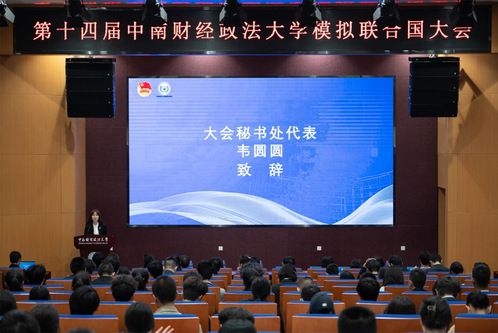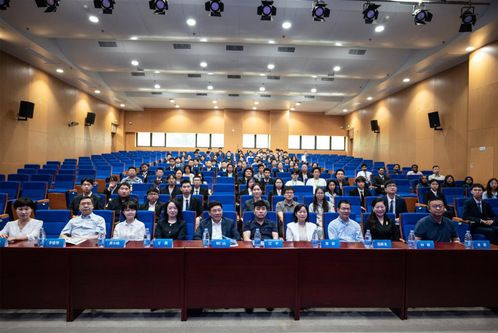Youth Voices Resonate with a Shared Future! The Opening of the 14th Model United Nations Conference at Zhongnan University of Economics and Law
On April 19, the 14th Model United Nations Conference of Zhongnan University of Economics and Law commenced in the North Lecture Hall of Wenhuan Building on the Nanhu Campus. A total of 125 delegates from eight countries and regions, including China, Russia, Pakistan, and Bangladesh, as well as 22 universities such as Fudan University, Wuhan University, Huazhong University of Science and Technology, and Beijing Normal University-Hong Kong Baptist University United International College, along with nine secondary schools including Wuwei No. 10 High School, High School Affiliated to Huazhong Normal University, and Wuhan No. 2 High School, gathered at our university for the event. Attendees at the opening ceremony included Liu Renshan, Member of the Standing Committee of the University Party Committee and Vice President; Huang Xiaomei, Secretary of the University Youth League Committee; Wan Li, Director of the International Exchange Department; Zheng Ying, Dean of the School of International Education; Wang Ping, Party Secretary of the School of Finance; Fan Xianlong, Deputy Director of the Student Affairs Department; Li Jianhua, Vice Dean of the School of Finance; and Deputy Party Secretaries Xiang Min and Zhu Chenglei. Liu Li, Principal of Wuwei No. 10 High School, led a delegation to participate in the conference.


Professor Liu Renshan, Member of the Standing Committee of the University Party Committee and Vice President, delivered a speech at the conference. Reflecting on the historical logic of the United Nations' founding and contemporary challenges to the international order, Vice President Liu Renshan highlighted the resonance between the spirit of the UN and the mission of youth. Taking the Law of the People's Republic of China on Foreign Relations as a starting point, he systematically elaborated on China’s innovative approach to global governance through the rule of law. By interpreting provisions in the law concerning sovereign equality and international cooperation, he emphasized its role as an "institutional interface" integrating domestic and foreign legal frameworks, reshaping the international legal order with the value orientation of a "community with a shared future for mankind." He noted that the Law of the People's Republic of China on Foreign Relations is a law that defines China’s relationship with the UN, upholds the authority of the UN, embodies the purposes and principles of the UN Charter, and promotes the values of the UN. China has consistently used this law as a cornerstone to integrate the preservation of the UN’s central role with the advancement of global governance reform. By proposing a rule-of-law approach to global governance based on "wide consultation, joint contribution, and shared benefits," China has demonstrated its historical consciousness and practical wisdom as a responsible major country in "seeking common prosperity for the world." In conclusion, Vice President Liu Renshan encouraged all participating youth to cultivate a global perspective and contribute their wisdom through the simulated diplomatic experience.

Vice President Liu Renshan presented the gavel to Ye Tingle, Academic Director of the conference. The gavel symbolizes order in the assembly and represents the strengthening of friendships and collaborative progress during deliberations.

On behalf of the Secretariat, student representative Wei Yuanyuan delivered a speech, systematically outlining the association’s educational collaboration with key secondary schools such as Huanggang High School, the Junior High School Affiliated to Huazhong Normal University, and Wuwei No. 10 High School in deepening Model UN engagement. She emphasized the significant value of Model UN activities in fostering global competence and social responsibility among youth. She pointed out that Model UN education not only builds an academic dialogue platform between secondary schools and universities but also, through practices such as topic research and role-playing, guides young people to engage with international issues and cultivate a multilateral cooperation mindset. She expressed hope that all participants would spark innovative thinking through intellectual exchange, enhance professional skills through simulated diplomatic practice, and collectively create a dynamic and fruitful academic event.

Over the three-day conference, delegates will discuss contemporary global conflicts and future collaborative development at the BRICS Summit, shouldering the mission of the times; navigate historical challenges in the French Empire, facing the tests of destiny; weigh the balance between nature and economy in the U.S. Federal Supreme Court, making decisive judgments; and explore post-war conflict resolution in the Security Council, safeguarding global peace and security.

Let us join together in anticipation of this extraordinary collision of ideas!